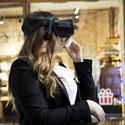Highlights
Coty Trials VR Fragrance Experience With A Retail Partner In Buenos Aires
 Coty Inc. has unveiled a virtual reality fragrance experience in partnership with retailer Julieraque in Buenos Aires, Argentina. The store’s visitors are invited to don a VR headset to virtually “pick up” seven scented stones, each of which activates a short video on a fragrance concept associated with the scent. The VR experience is just one of a number of digital innovations Coty is introducing, including a voice assistant tool for Clairol and stations at Covergirl’s New York flagship store powered by augmented reality and artificial intelligence. Other premium fragrance brands are also trying out technology as a way to address a slowing market: the premium fragrance category is expected to grow 13 percent in the 2017-22 period, down from 16 percent in the 2012-17 period, according to Euromonitor International forecasts. Coty plans to take the VR experience to other markets and to customize it for specific brands.[Image Credit: © Coty Inc.]
Coty Inc. has unveiled a virtual reality fragrance experience in partnership with retailer Julieraque in Buenos Aires, Argentina. The store’s visitors are invited to don a VR headset to virtually “pick up” seven scented stones, each of which activates a short video on a fragrance concept associated with the scent. The VR experience is just one of a number of digital innovations Coty is introducing, including a voice assistant tool for Clairol and stations at Covergirl’s New York flagship store powered by augmented reality and artificial intelligence. Other premium fragrance brands are also trying out technology as a way to address a slowing market: the premium fragrance category is expected to grow 13 percent in the 2017-22 period, down from 16 percent in the 2012-17 period, according to Euromonitor International forecasts. Coty plans to take the VR experience to other markets and to customize it for specific brands.[Image Credit: © Coty Inc.]
Coty Builds On Its Digital Push With An AR Mirror For Wella Salons
 Beauty company Coty, Inc. has launched an augmented reality mirror for its Wella Professionals salons, allowing customers to “try on” various hair colors and shades. A facial recognition feature enables the consultant to retrieve images of how the customer previously looked. The innovation builds on the company’s drive in digital technology, which includes a virtual reality experience for its fragrances, an AR partnership between Clairol and Snapchat, VR applications for CoverGirl, and a blended reality mirror for its Bourjois boutique in Paris. The new Wella mirror was developed alongside CareOS, a tech company in the health and beauty space. The mirror can capture a 360-degree video for the customer to see the look from all angles. The company plans to develop a version for phones and tablets, for salons without the space or funds for the mirror.[Image Credit: © Coty Inc.]
Beauty company Coty, Inc. has launched an augmented reality mirror for its Wella Professionals salons, allowing customers to “try on” various hair colors and shades. A facial recognition feature enables the consultant to retrieve images of how the customer previously looked. The innovation builds on the company’s drive in digital technology, which includes a virtual reality experience for its fragrances, an AR partnership between Clairol and Snapchat, VR applications for CoverGirl, and a blended reality mirror for its Bourjois boutique in Paris. The new Wella mirror was developed alongside CareOS, a tech company in the health and beauty space. The mirror can capture a 360-degree video for the customer to see the look from all angles. The company plans to develop a version for phones and tablets, for salons without the space or funds for the mirror.[Image Credit: © Coty Inc.]
Beauty Brand YSL Opens Two Pop-Up Hotels, Plans Many More
Olay Presents A Range Of Beauty Tech At CES 2019
 Procter & Gamble’s Olay brand has unveiled a range of innovations at CES 2019, including three updates to its Olay Skin Advisor platform. It is also debuting Olay Labs, a service for personalized software and beauty regimens, and the Olay FaceNavi Smart Wand for diagnostic skin applications. The three Skin Advisor updates, currently rolling out in the US, are: Olay Future You Simulation, for visualizing how the user’s skin and face might look in the future under different assumptions; Olay Whips Simulator, to virtually try on products from the Whips line; and Skin Decoder, a camera attachment for a phone that provides a high-resolution image for diagnosing and tracking skin over time. Olay Labs combines machine learning and human expertise to develop a four-week regime, and the Smart Wand uses electromagnetic technology to send data on the skin to an app, which assesses appropriate ingredients to use on the user’s skin.[Image Credit: © Procter & Gamble]
Procter & Gamble’s Olay brand has unveiled a range of innovations at CES 2019, including three updates to its Olay Skin Advisor platform. It is also debuting Olay Labs, a service for personalized software and beauty regimens, and the Olay FaceNavi Smart Wand for diagnostic skin applications. The three Skin Advisor updates, currently rolling out in the US, are: Olay Future You Simulation, for visualizing how the user’s skin and face might look in the future under different assumptions; Olay Whips Simulator, to virtually try on products from the Whips line; and Skin Decoder, a camera attachment for a phone that provides a high-resolution image for diagnosing and tracking skin over time. Olay Labs combines machine learning and human expertise to develop a four-week regime, and the Smart Wand uses electromagnetic technology to send data on the skin to an app, which assesses appropriate ingredients to use on the user’s skin.[Image Credit: © Procter & Gamble]
La Roche-Posay Showcases Its Skin pH Wearable Sensor
Copyright 2025 Business360, Inc.


